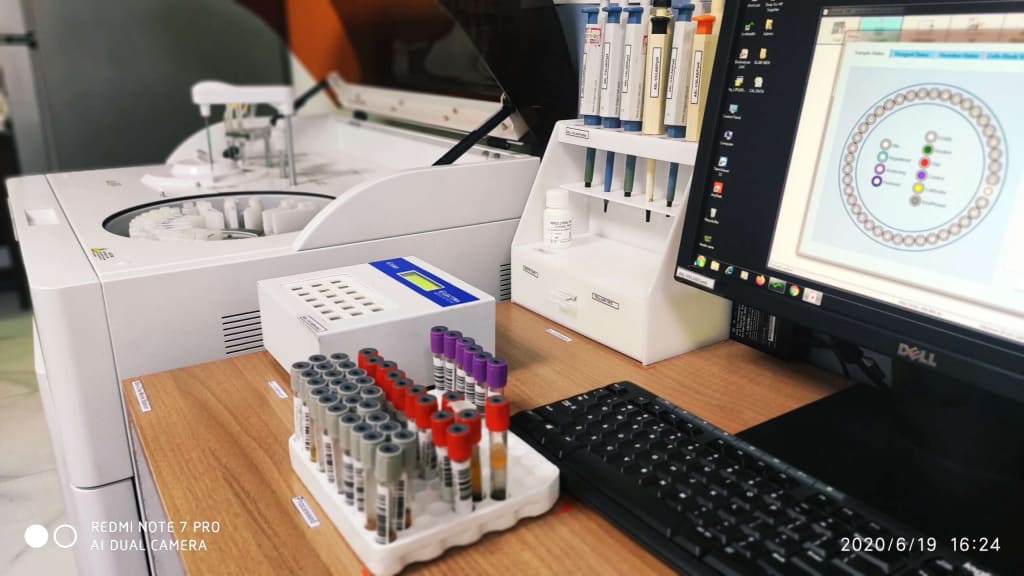
Amniocentesis also called amniosis is a pregnancy procedure that involves withdrawing a small volume of amniotic fluid from the sac containing the foetus for examination.
The process of amniocentesis:
The prenatal test that your doctor will prescribe during pregnancy is amniocentesis. Fetal variances including Down syndrome and cystic fibrosis (down syndrome) as well as spina bifida (Split spine) are tested. The findings are common in most situations and within 16-20 weeks, the patient is diagnosed.
The most common reason for amniocentesis is to assess if a foetus has any genetic defects or chromosome abnormalities, such as Down syndrome.
These prenatal examinations can prove useful to expectant guardians, as they make it possible to evaluate the status of the foetal health and the feasibility of care.
A woman who is 15 to 20 weeks pregnant undergoes in this process. Women who opt for this test are mostly at an elevated risk of genetic and chromosome disorders, partly due to the invasiveness and the low risk of error.
This can be used for pre-natal sex discernment and thus in some countries, this practise has legal constraints.
What to expect in test procedure?
It only takes few minutes and it goes as follows:
• The women lie on her back while a doctor spreads gel over her abdomen
• The doctor uses ultrasound to find fetus and placenta
• The doctor cleans a small section of skin and, using the ultrasound imaging as a guide, insert a long, thin needle into the abdomen.
• They extract a small sample of fluid and remove the needle.
• The doctor may also check the vital signs of the fetus including the heartbeat.
The amniocentesis procedure is performed by:
It extracts no blood from the baby's bag in the abdomen (uterus). It is usually performed in a physician's office or emergency centre. You don't have to be hospitalised.
Next, you'll have an ultrasound pregnancy. This encourages the doctor to see where the baby is in your womb.
The drug is then rubbed on your belly. Often a shot in the muscle of the belly section takes the drug. A disinfectant is used to cleanse the flesh.
Amniocentesis is used for determining:
Genetic Diagnosis: Amniocentesis is used in early pregnancy to diagnose chromosome, genetic or other foetal defects, such as: Down syndrome, Trisomy 13, Trisomy 18, sex chromosome anomalies, fragile, Rare, inherited metabolic disorders.
Lung Development: It can be used to test fetal lung development. Lung development problems may raise the risk of respiratory distress syndrome for infants. The growth of the foetal lung can be measured in pregnancies of over 30 weeks of surfactants in the amniotic fluid.
Infection: Infections can be detected by decreasing blood glucose levels, gramme stain showing bacteria, or irregular white blood cell differential counts.
Rh Incompatibility: Amniocentesis can be used to diagnose Rh incompatibility, which occurs when the mother's blood type is Rh-negative and the foetus' blood type is Rh-positive. Early detection is critical for administering Rh immune globulin to the mother and treating her baby for hemolytic anaemia.
Decompression of polyhydramnios: Decompression amniocentesis will improve the accumulation of amniotic fluids, which increases the likelihood of caesarean section. Amniocentesis may also be used to rule out the possibility of polyhydramnios.
Preterm rupture of membranes: A developing indication for amniocentesis is in the management of preterm rupture of membranes where amount of certain amniotic fluid inflammatory markers may be helpful.
Purpose of Amniocentesis:
• Amniocentesis is an optional operation. Health care providers prefer to do so only as needed by women and such health conditions involving their pregnancy are more likely to arise.
• It allows to confirm with another testing to a preliminary diagnosis of an abnormality.
• Helps to discover out a foetus has no known abnormality. This helps couples to prepare and remember the rest of the pregnancy.
Risks associated with amniocentesis:
• Amniocentesis is an intervention in the development of the fetus that can check for genetic or congenital disorders. However, it is optional.
• Amniocentesis problems include preterm labour and delivery, respiratory dysfunction, postural distortions, chorioamnionitis, trauma to the foetus and mother's alloimmunizations.
• Other risks include leaks and bleeding of amniotic fluid. Both are important because they can cause spontaneous abortion in pregnant patients.
Amniocentesis positive results:
• The first results will be available within 3 days and this will let you know whether a chromosomal condition, such as Down's syndrome, Edwards' syndrome or Patau's syndrome, has been found.
• It can also take 3 weeks or more for the results to come back if there are rarer conditions.
• Results will receive over the phone, or during face meeting or at home and will receive a written confirmation of the results.
To know more about Amniocentesis testing, visit add-on scans and labs diagnostic team to discuss about plans and safety.
Call us on +91 9900811118 or book an appointment with add-on scans and labs specialists.
About the Creator
My Skool
Get the Best CBSE and ICSE schools in Bangalore. Get admissions in Top CBSE and ICSE Schools of Bangalore -
Save up to a lakh.
Located at Bangalore to provide best education for every individual .






Comments
There are no comments for this story
Be the first to respond and start the conversation.